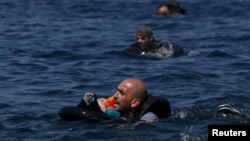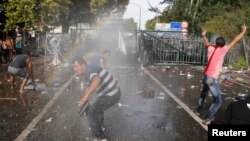A top-ranking U.S. general says he would not recommend buffer and no-fly zones in Syria where people fleeing their homes can be protected from air attacks by Syrian government forces.
General Lloyd Austin, head of U.S. Central Command, told the Senate Armed Services Committee on Wednesday a ground force would be needed to protect the refugees, but he said that such a force is not available at this time.
Senator John McCain, chairman of the committee, asked the general if the massive flow of refugees from Syria affects what the U.S. should be doing in that country.
"This is a horrible tragedy," the general said, "and this is a thing that the entire international community is going to have to continue to work together on. We would hope as these refugees continue to be disadvantaged that we see more countries joining in to assist.”
McCain blasts Assad
McCain accused the government of Syrian President Bashar al-Assad of dropping barrel bombs on refugees and slaughtering them.
The Syrian conflict, which began in March 2011 as peaceful protests before being met by a harsh crackdown and spiraling into a multi-party civil war, has forced half of all Syrians from their homes.
Austin also commented on the belief that Russia is setting up an air base near the northwestern Syrian port of Latakia, and it is sending soldiers and weapons into Syria to support Assad.
“We are witnessing a buildup of forces in Syria by Russia," the general said. "As you know, they have been there all along, but they are increasing their footprint. What they've stated is that they want to focus on helping to counter ISIL as I understand it. That's left to be seen.
"As you know, Russia is not very transparent and so we really don’t know what their true intentions are. But the potential introduction of additional capability and operations, or utilizing that capability, could increase the friction in that battlespace significantly," said Austin.
Earlier, Assad blamed Western nations for the surge of refugees who have left his country and made their way to Europe, saying the West has supported "terrorism" since the start of the Syrian crisis.
Assad remains defiant
In an interview with Russian media, Assad rejected the view that government actions are responsible for people fleeing or that the crisis started as a peaceful uprising. He said that is part of the propaganda by Western governments that, as he put it, are simultaneously sympathizing with the refugees while also causing them to be in danger in the first place.
"So as long as they follow this propaganda, they will have more refugees," Assad said. "So it's not about Europe didn't accept them or invite them as refugees, it's about not dealing with the cause. Stop — if you are worried about them — stop supporting terrorists."
Assad has long described any anti-government fighters as "terrorists." The U.S. and some European nations have provided what they call moderate rebels with military equipment and training.
The conflict in Syria became more complicated with the emergence of the Islamic State militant group, which seized large areas in northern and eastern Syria, including its de facto capital in the city of Raqqa. Combating the group is the one area of consensus between Syria and a U.S.-led coalition of nations that has been carrying out airstrikes against the militants for the past year.
Both Syria and the U.S. have said they do not cooperate in their missions against the Islamic State. Assad said at one point there was indirect contact with Iraq as an intermediary, but no longer.
"For them maybe if they cooperate with the Syrian army, this is like a recognition of our effectiveness in fighting ISIS. This is part of willful blindness of American administration, unfortunately," said Assad.
But while renewing his criticism of the U.S.-led bombing campaign that has included more than 2,500 airstrikes, Assad said the militants continue to grab more Syrian territory.
"The reality is that despite the coalition having started its operation, Islamic State continues its expansion," he said. "They cannot do anything. This coalition does not affect the situation on the ground."
He called on the government, political sector and those who have fought against him to unite against terrorism, saying that is the only way to achieve a political solution in Syria.
"We can achieve consensus, but we cannot implement unless we defeat the terrorism in Syria. We have to defeat terrorism, not only ISIS," said Assad.
He also reiterated it is up to the Syrian people to choose their leadership and not "because of the judgment of the United States, the U.N. Security Council, the Geneva Conference or the Geneva Communique."
Death, refugees
U.S. officials, including President Barack Obama, have said Assad should step down, while the 2012 Geneva Communique and the two rounds of unsuccessful peace talks that followed in 2014 included efforts to resolve the crisis with a political transition in Syria.
"If the people want him to stay, the president stays," Assad said. "In the opposite case, he should swiftly step down."
The fighting in Syria has killed an estimated 240,000 people in Syria and pushed more than 4 million people into neighboring countries and beyond.
Inside of Syria, the U.N. says another 7.6 million people are displaced, while appeals remain vastly underfunded for billions of dollars in aid this year to help all those affected by the fighting.






